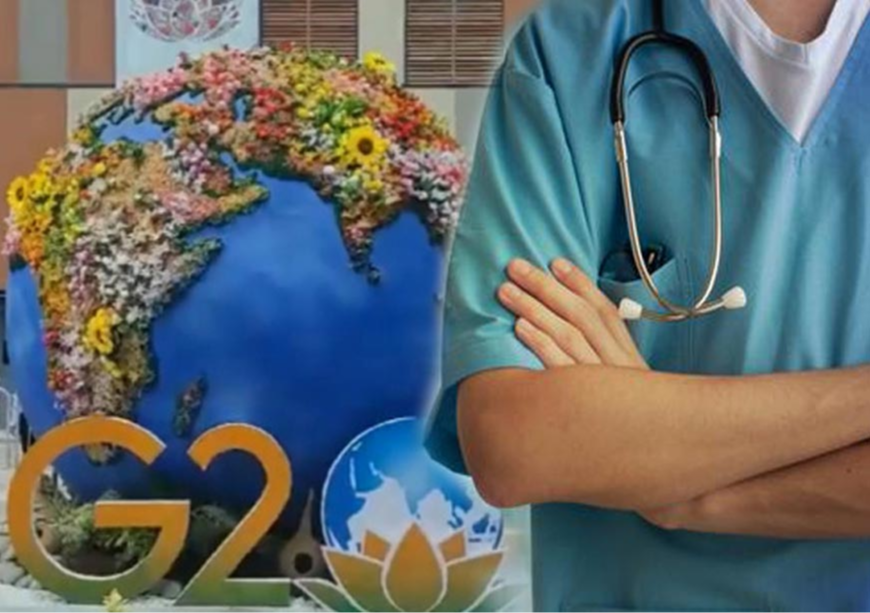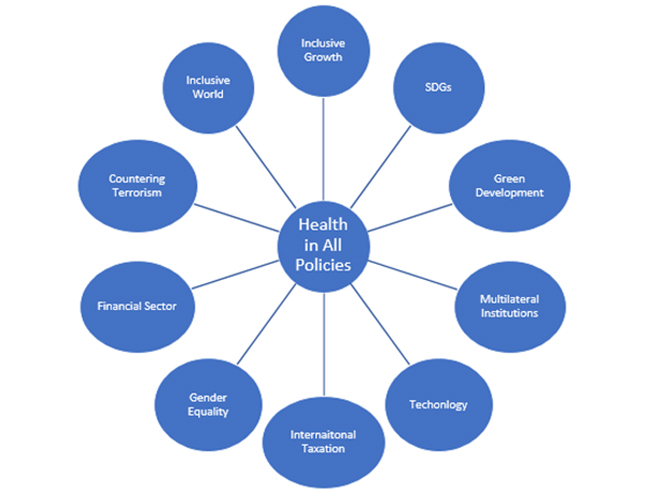-
CENTRES
Progammes & Centres
Location
The New Delhi Declaration’s policy commitments in the health sector emphasise the role of the G20 in revising the existing financial and global health governance discussions.

Since the inception of the G20 Summits in 2008, the economic grouping has diversified the topics discussed at the forum from a predominant focus on finance-related concerns to socio-economic and environmental issues of the world. Health, being a key developmental indicator, has been on the rise as a topic of discussion in recent years, as depicted in Figure 1 which shows the relative frequency of the topics being discussed in the G20 Leaders’ Declaration over the years.
Before the 2023 G20 Summit, the grouping has made health commitments in terms of public health and pension plans; food security; nutrition; environment; anti-microbial resistance (AMR); sustainable funding mechanisms to build health systems; digital health; and strengthening pandemic prevention, preparedness and response. However, a commitment-compliance gap in health needs to be addressed, as member states have complied with only 80 percent of these global health governance commitments as of 2022. The permanent membership of the African Union (AU) to the G20 during the New Delhi Summit has made it imperative to focus on the health dimension as it brings along some of the poorest countries with greater disease burdens on board.
Figure 1. Relative frequency of selected topics discussed in G20 Summits

The New Delhi G20 Leaders’ Declaration witnessed a unanimous consensus on important contemporary matters such as inclusive growth, accelerating progress on the Sustainable Development Goals (SDGs), green development, reform of multilateral institutions, technology, international taxation, gender equality, finance, and countering terrorism. The health commitments, as a part of the SDGs in the New Delhi Declaration, reiterate the discussion that took place at the Rome 2021 and Bali 2022 G20 Summits. Emphasis was laid on the implementation of the “One Health” approach to tackle Anti-Microbial Resistance (AMR); promotion of Universal Health Coverage (UHC) and mental health; equitable distribution of vaccines, therapeutics, and diagnostics; building resilient health systems; enhancing pandemic preparation; and fostering infectious disease surveillance. Additionally, the New Delhi Declaration brought its uniqueness to the health discussion with the increased focus on women and children's health and nutrition, establishment of the Global Initiative on Digital Health, a strong call for international counter-narcotics cooperation, enhanced collaboration between Finance and Health Ministries under the Joint Finance and Health Task Force (JFHTF), and commitment to provide medical countermeasures to low middle-income Countries (LMICs), least developed countries, and small island and developing states.
The health commitments, as a part of the SDGs in the New Delhi Declaration, reiterate the discussion that took place at the Rome 2021 and Bali 2022 G20 Summits.
While the health-focused commitments provide an impetus to build resilient health systems for the well-being of the people, it is equally important to understand the health implications of the policy commitments across sectors. The Health in All Policies (HiAP) approach seeks the synergies of multi-sectoral policies and focuses on legitimacy, accountability, transparency, access to information, participation, sustainability, and collaboration for health and health equity. Figure 2 depicts how HiAP is a vital lens to examine health as a cross-sectoral entity in all the major policy commitments made in the New Delhi G20 Leaders’ Declaration.
Figure 2. Health as a cross-sectoral entity of the G20 commitments

An inspection of key commitments of the New Delhi G20 Declaration suggests that policy interventions in various sectors have an impact on the health sector. For instance, the G20’s focus on strong, sustainable, balanced, and inclusive growth that promotes individual well-being across socioeconomic groups could have a positive impact on health, as a 10 percent increase in income can contribute to a gain of 2.2 months of life expectancy. The G20’s priority of the green development pact for a sustainable future is also essential for the development of the health sector as the direct cost of climate change to health is estimated to be US$ 2-4 billion per year by 2030. The energy transition commitment as a part of green development action can also complement the World Health Organisation (WHO) initiative of the Global Health and Energy Platform of Action (HEPA) that aims to provide access to clean and sustainable energy to protect health.
The G20’s priority of the green development pact for a sustainable future is also essential for the development of the health sector as the direct cost of climate change to health is estimated to be US$ 2-4 billion per year by 2030.
The grouping’s commitment to accelerating progress on the SDGs connects health to other concerns such as hunger and malnutrition, energy insecurity, and education. Eliminating hunger and malnutrition is vital for the health of children as they are more susceptible to being impacted by poor health due to deprivation of food. Energy insecurity has been a concern for healthcare facilities in LMICs where close to 1 billion people are being treated without reliable electricity or no access to electricity. The synergy of finance and health policies is crucial as 930 million people globally are at risk of being pushed into poverty due to out-of-pocket expenditures on health. The interlinkage of health and education becomes necessary as increasing education attainment among adults has led to better health and longer lifespans.
The COVID-19 pandemic brought the need to invigorate the multilateral institutions that were challenged due to their delayed and ineffective response to the global health crisis. Despite the provisions of financial packages to LMICs by the International Financial Institutions (IFIs), the concerns of pre-existing debt got aggravated and the measures taken were not sufficient to address vaccine inequity. This has called for the G20 to emphasise managing global debt vulnerabilities to mitigate implications on health outcomes. The financial sector measures can help reduce the gaps in funding by adding a health component (H) into Environmental, Social and Governance (ESG) investment criteria, which can promote the involvement of private players and act as a catalyst to bring health into mainstream investments. The international taxation measure can introduce health taxes on food items that contain high levels of fat, sugar or salt to improve diets, as observed in the case of Hungary, Saint Vincent and the Grenadines, and Tonga, to prevent negative health outcomes and repurpose the funds to develop health systems.
The technological transformation and digital public infrastructure initiatives proposed in the New Delhi G20 Declaration can fast-track the digitising of the health industry, which has become a necessity since the pandemic. This commitment can also enable the application of Artificial Intelligence (AI) in healthcare, whose value is estimated to reach US$ 187 billion by 2030. Additionally, the policy priority of gender equality and empowering all women and girls can impact health, as the barriers faced by them in accessing healthcare services, restricted mobility, lack of decision-making powers, discrimination, and inadequate awareness must be addressed. The increasing political participation of women has also led to positive outcomes in development indicators such as education, nutrition, health, and income.
The technological transformation and digital public infrastructure initiatives proposed in the New Delhi G20 Declaration can fast-track the digitising of the health industry, which has become a necessity since the pandemic.
The G20 has repeatedly condemned all forms of terrorism and has been working towards enhancing international cooperation to develop effective counter-terrorism measures by adopting a holistic approach that includes the protection of health and other critical infrastructures. Furthermore, the objective of creating a more inclusive world has led to the inclusion of the AU in the group. This has brought an opportunity for African countries to act on areas where there has been little progress in the past and boost domestic financing for health by introducing non-traditional and innovative financing mechanisms.
The New Delhi Declaration’s policy commitments across sectors have a direct or indirect impact on health. Thus, the grouping must be cautious of overlooking the health implications of multi-sectoral policies as it enables building an equitable, inclusive, sustainable, and resilient health system globally. This can be done through a multi-stakeholder consultation process as a part of the implementation of the policies. This could enhance the health outcomes of the member states and reduce the commitment-compliance gap of the group. The G20 is a key platform that can push for revising the existing financial and global health governance discussions, revitalising manufacturing industries of vaccines, therapeutics, and diagnostics, and deliberate on trade-related intellectual property rights issues among its member countries and international organisations.
The upcoming Brazilian Presidency, with the India-Brazil-South Africa (IBSA) troika, must continue and develop futuristic and robust commitments compared to the preceding presidencies.
The continuation of the commitments in declarations of successive summits is essential for the cohesion of the G20. The upcoming Brazilian Presidency, with the India-Brazil-South Africa (IBSA) troika, must continue and develop futuristic and robust commitments compared to the preceding presidencies. The IBSA must ensure that while the pandemic is over, the health and related discussion is not brushed off at the global level. Thus, discussions on the reformation of International Health Regulation (2005); One Health to tackle AMR, UHC, and the Pandemic Treaty; mobilising funds for health; and mitigating disease burden are essential to prepare, prevent, and respond to any future global health crisis.
Sanjay Pattanshetty, Head of the Department of Global Health Governance and Coordinator of Centre for Health Diplomacy, Prasanna School of Public Health.
Aniruddha Inamdar is a Research Fellow at the Centre for Health Diplomacy, Prasanna School of Public Health.
Kiran Bhatt is a Research Fellow at the Centre for Health Diplomacy, Department of Global Health, Prasanna School of Public Health.
Helmut Brand is the Founding Director of the Prasanna School of Public Health.
The views expressed above belong to the author(s). ORF research and analyses now available on Telegram! Click here to access our curated content — blogs, longforms and interviews.

Dr. Sanjay M Pattanshetty is Head of theDepartment of Global Health Governance Prasanna School of Public Health Manipal Academy of Higher Education (MAHE) Manipal Karnataka ...
Read More +
Aniruddha Inamdar is a Research Fellow at the Centre for Health Diplomacy, Department of Global Health Governance, Prasanna School of Public Health, Manipal Academy of ...
Read More +
Kiran Bhatt is a Research Fellow at the Centre for Health Diplomacy, Department of Global Health Governance, Prasanna School of Public Health, Manipal Academy of ...
Read More +
Prof. Dr.Helmut Brand is the founding director of Prasanna School of Public Health Manipal Academy of Higher Education (MAHE) Manipal Karnataka India. He is alsoJean ...
Read More +